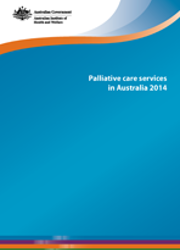Summary
This report on Australian palliative care services is the third in this series. It provides detailed information on the national response to the palliative care needs of Australians, using a range of Australian Institute of Health and Welfare and other data sources.
Service provision
There were 57,614 palliative care-related separations from public and private hospitals in Australia in 2011-12, with patients aged 75 and over accounting for half (49.1%) of these. There was a 52% increase in palliative care-related separations between 2002-03 and 2011-12.
In 2011-12, palliative care-related separations accounted for 0.6% of all separations, but more than 39.5% of patients who died as an admitted patient had been a palliative care patient during their final separation. Approximately 17,200 palliative care patients died with cancer as a principal diagnosis.
There were just over 226,000 permanent residential aged care residents in 2012-13 with completed Aged Care Funding Instrument (ACFI) assessments; almost 1 in 18 of these residents had an ACFI assessment indicating the need for palliative care during this reporting period.
Resources and outcomes
Nationally, about 11,700 patients received a palliative medicine specialist service subsidised through the Medicare Benefits Schedule during 2012-13, for which approximately
$4.7 million was paid in benefits. Over the 5 years to 2012-13, the benefits paid for all palliative medicine specialist services more than doubled.
Nationally, more than 19,500 patients had a palliative care-related prescription subsidised through the Pharmaceutical Benefits Scheme during 2012-13. This equates to a rate of 85.2 patients per 100,000 population. The medication type laxatives were the palliative care-related prescriptions most often dispensed in 2012-13, followed by analgesics and anti-epileptics (37.3%, 26.6% and 14.2%, respectively).
Specialist palliative medicine physicians made up nearly 5 in 1,000 (0.53%) employed medical specialists in Australia, with an estimated 148 working in Australia in 2012. In 2012, over half (56.5%) of employed specialist palliative medicine physicians were female; only 26.8% of other employed clinician specialists were female.
There were 106 specialist palliative care service providers that reported to the Palliative Care Outcomes Collaboration (PCOC) in 2013-a decrease of 2 services since 2012. More than 31,500 patients accessed specialist palliative care services in 2013, an increase of 3.6% from 2012 (30,405). Around two-thirds (66.3%) of all PCOC contributing providers met benchmark 1, where 90% of patients had their episode start on the day of, or the day after, the date ready for care.
Preliminary material: Acknowledgments; Abbreviations; Symbols; Resources and outcomes
1 Introduction
- Defining palliative care
- Palliative care in Australia
- National policies for palliative care
- Report structure
2 Admitted patient palliative care
- Introduction
- Admitted patient palliative care in 2011-12
- Profile of palliative care-related separations in 2011-12
- Characteristics of admitted palliative care patients
- Diagnosis-related information
- Change over time in the amount of activity
- Palliative care and deaths in hospital
3 Palliative care in general practice
- Introduction
- BEACH survey data
- Palliative care-related encounters
4 Services provided by palliative medicine specialists
- Introduction
- Characteristics of patients receiving palliative medicine specialist services
- Types of MBS-subsidised palliative medicine specialist services
5 Palliative care in residential aged care
- Data source
- Characteristics of residential aged care residents receiving palliative care
- Length of stay
6 Palliative care-related medications
- Introduction
- Characteristics of patients receiving palliative care-related prescriptions
- Types of palliative care-related prescriptions and prescribing clinicians
7 Workforce
- Introduction
- Specialist palliative medicine physicians
8 Palliative care outcomes
- Introduction
- Palliative Care Outcomes data set
- Patient characteristics
- Episode length
- Palliative care phases
- Palliative care outcome measures and benchmarks
9 Palliative care facilities and services
- Hospice units in public hospitals
- Private acute and psychiatric hospitals
- Community Nursing Program for veterans
- Palliative care Standards
Appendixes
Appendix A: Identifying palliative care separations
Appendix B: Data sources
Appendix C: Technical notes
Appendix D: Classifications
Appendix E: PCOC benchmark revisions
End matter: Supplementary tables; Glossary; References; List of tables; List of figures; List of boxes; Related publications



